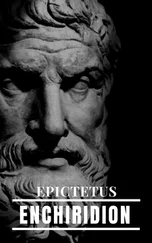1 ...7 8 9 11 12 13 ...25 27. Just as a mark is not set up in order to be missed, so neither does the nature of evil arise in the universe. 11
28. If someone handed over your body to any person who met you, you would be vexed; but that you hand over your mind to any person that comes along, so that, if he reviles you, it is disturbed and troubled—are you not ashamed of that?
29. 12In each separate thing that you do, consider the matters which come first and those which follow after, and only then approach the thing itself. Otherwise, at the start you will come to it enthusiastically, because you have never reflected upon any of the subsequent steps, but later on, when some difficulties appear, you will give up disgracefully. Do you wish to win an Olympic victory? So do I, by the gods! for it is a fine thing. But consider the matters which come before that, and those which follow after, and only when you have done that, put your hand to the task. You have to submit to discipline, follow a strict diet, give up sweet cakes, train under compulsion, at a fixed hour, in heat or in cold; you must not drink cold water, 13nor wine just whenever you feel like it; you must have turned yourself over to your trainer precisely as you would to a physician. Then when the contest comes on, you have to "dig in" 14beside your opponent, and sometimes dislocate your wrist, sprain your ankle, swallow quantities of sand, sometimes take a scourging, and along with all that get beaten. After you have considered all these points, go on into the games, if you still wish to do so; otherwise, you will be turning back like children. Sometimes they play wrestlers, again gladiators, again they blow trumpets, and then act a play. So you too are now an athlete, now a gladiator, then a rhetorician, then a philosopher, yet with your whole soul nothing; but like an ape you imitate whatever you see, and one thing after another strikes your fancy. For you have never gone out after anything with circumspection, nor after you had examined it all over, but you act at haphazard and half-heartedly.
In the same way, when some people have seen a philosopher and have heard someone speaking like Euphrates 15(though, indeed, who can speak like him?), they wish to be philosophers themselves. Man, consider first the nature of the business, and then learn your own natural ability, if you are able to bear it. Do you wish to be a contender in the pentathlon, or a wrestler? Look to your arms, your thighs, see what your loins are like. For one man has a natural talent for one thing, another for another. Do you suppose that you can eat in the same fashion, drink in the same fashion, give way to impulse and to irritation, just as you do now? You must keep vigils, work hard, abandon your own people, be despised by a paltry slave, be laughed to scorn by those who meet you, in everything get the worst of it, in honour, in office, in court, in every paltry affair. Look these drawbacks over carefully, if you are willing at the price of these things to secure tranquillity, freedom and calm. Otherwise, do not approach philosophy; don't act like a child—now a philosopher, later on a tax-gatherer, then a rhetorician, then a procurator of Caesar. These things do not go together. You must be one person, either good or bad; you must labour to improve either your own governing principle or externals; you must work hard either on the inner man, or on things outside; that is, play either the rôle of a philosopher or else that of a layman.
30. Our duties are in general measured by our social relationships. He is a father. One is called upon to take care of him, to give way to him in all things, to submit when he reviles or strikes you. "But he is a bad father." Did nature, then, bring you into relationship with a good father? No, but simply with a father. "My brother does me wrong." Very well, then, maintain the relation that you have toward him; and do not consider what he is doing, but what you will have to do, if your moral purpose is to be in harmony with nature. For no one will harm you without your consent; you will have been harmed only when you think you are harmed. In this way, therefore, you will discover what duty to expect of your neighbour, your citizen, your commanding officer, if you acquire the habit of looking at your social relations with them.
31. In piety towards the gods, I would have you know, the chief element is this, to have right opinions about them—as existing and as administering the universe well and justly—and to have set yourself to obey them and to submit to everything that happens, and to follow it voluntarily, in the belief that it is being fulfilled by the highest intelligence. For if you act in this way, you will never blame the gods, nor find fault with them for neglecting you. But this result cannot be secured in any other way than by withdrawing your idea of the good and the evil from the things which are not under our control, and placing it in those which are under our control, and in those alone. Because, if you think any of those former things to be good or evil, then, when you fail to get what you want and fall into what you do not want, it is altogether inevitable that you will blame and hate those who are responsible for these results. For this is the nature of every living creature, to flee from and to turn aside from the things that appear harmful, and all that produces them, and to pursue after and to admire the things that are helpful, and all that produces them. Therefore, it is impossible for a man who thinks that he is being hurt to take pleasure in that which he thinks is hurting him, just as it is also impossible for him to take pleasure in the hurt itself. Hence it follows that even a father is reviled by a son when he does not give his child some share in the things that seem to be good; and this it was which made Polyneices and Eteocles enemies of one another, the thought that the royal power was a good thing. That is why the farmer reviles the gods, and so also the sailor, and the merchant, and those who have lost their wives and their children. For where a man's interest lies, there is also his piety. Wherefore, whoever is careful to exercise desire and aversion as he should, is at the same time careful also about piety. But it is always appropriate to make libations, and sacrifices, and to give of the firstfruits after the manner of our fathers, and to do all this with purity, and not in a slovenly or careless fashion, nor, indeed, in a niggardly way, nor yet beyond our means.
32. 16When you have recourse to divination, remember that you do not know what the issue is going to be, but that you have come in order to find this out from the diviner; yet if you are indeed a philosopher, you know, when you arrive, what the nature of it is. For if it is one of the things which are not under our control, it is altogether necessary that what is going to take place is neither good nor evil. Do not, therefore, bring to the diviner desire or aversion, and do not approach him with trembling, but having first made up your mind that every issue is indifferent and nothing to you, but that, whatever it may be, it will be possible for you to turn it to good use, and that no one will prevent this. Go, then, with confidence to the gods as to counsellors; and after that, when some counsel has been given you, remember whom you have taken as counsellors, and whom you will be disregarding if you disobey. But go to divination as Socrates thought that men should go, that is, in cases where the whole inquiry has reference to the outcome, and where neither from reason nor from any other technical art are means vouchsafed for discovering the matter in question. Hence, when it is your duty to share the danger of a friend or of your country, do not ask of the diviner whether you ought to share that danger. For if the diviner forewarns you that the omens of sacrifice have been unfavourable, it is clear that death is portended, or the injury of some member of your body, or exile; yet reason requires that even at this risk you are to stand by your friend, and share the danger with your country. Wherefore, give heed to the greater diviner, the Pythian Apollo, who cast out of his temple the man who had not helped his friend when he was being murdered. 17
Читать дальше












